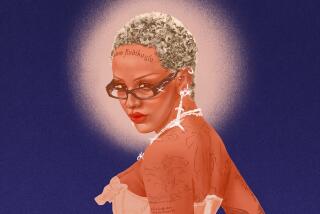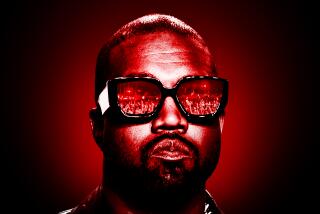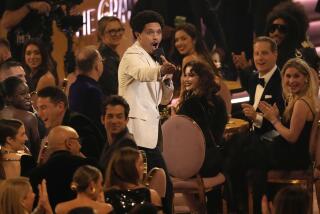Rapper Aminé on pushing boundaries, wearing whiteface in the Trump era and his Coachella show
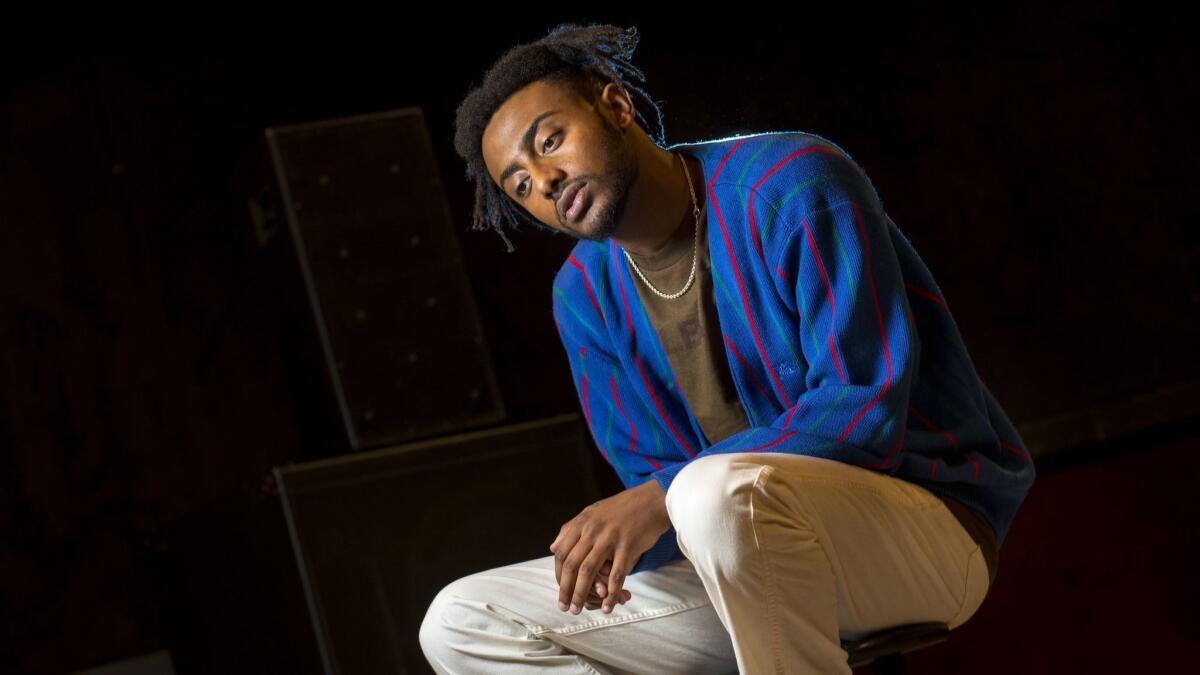
Alternative rapper Aminé is described as “stylistically left of center” in his Apple Music bio, news the 24-year-old greets with a laugh.
“That needs to change soon,” he said still smirking. “I don’t know who made that to be honest. It’s a very funny bio; I love it. It makes me look good, but I would never speak about myself that way.”
The rapper, singer and songwriter prefers to forgo labels.
“I hate conforming to what people expect me to do,” he said during a break from rehearsals before the Coachella Valley Music and Arts Festival, where he’ll be on the Mojave Stage Sunday for the second weekend in a row.
That desire to go his own way is partly behind his decision to release the more challenging single “Red Mercedes” after “Caroline,” his debut single that spent 28 weeks on the Billboard Hot 100 chart, peaking at No. 11, and which boasts 221 million video views.
“I didn’t want to release a song like ‘Spice Girl’ right after ‘Caroline’ because I didn’t want another ‘hit’ kind of song,” he said of the fifth single released from his debut album “Good for You.” “I wanted something that your [average] girl wouldn’t like. I wanted something that was rugged and rough and just showed people that there’s another side to my music.”
In the video for “Red Mercedes,” Aminé employs whiteface to play a white customer walking into a car dealership staffed with a skeptical black sales staff to illustrate the differences between how white and black people of means are treated in America.
“I actually have a red Mercedes,” he said. “[But] when I step onto a dealership — or anywhere nice — and I have some change in my pocket and I’m able to spend money … to me, I’m just ‘successful’ with quotation marks.”
I can’t just sit here and shuck and jive for people. I have to say something. That’s just me as an artist. I say what needs to be said.
— Aminé
“My favorite Kanye lyric is, ‘Even if you in a Benz, you still a ... in a coup,’ which is very true,” he continued. ”And that’s what I wanted to convey with ‘Red Mercedes,’ but making the opposite race feel the same way I feel.”
Makeup for the video, which currently stands at 15.8 million views (with 260,000 up-votes), took hours, he recalled.
“I pissed a lot of people off and made a lot of people happy with that video so it’s funny. I don’t read YouTube comments, I don’t really give a ... I’ll do whatever I want to do. But it’s funny when I see people get mad. It’s a music video. It’s my art. So I’ll do whatever I want.”
The video was far from the only time the outspoken artist veered into controversial territory. During a performance on “The Tonight Show Starring Jimmy Fallon” in November 2016, Aminé offered a stripped-down rendition of “Caroline” before shifting into a new verse criticizing the newly elected president. (“You can never make America great again,” he sang. “All you ever did was make this country hate again.”)
“It was more so, ‘This is my first TV debut, Trump just got elected, I can’t just sit here and shuck and jive for people,’” he recalled. “I have to say something. That’s just me as an artist. I say what needs to be said.”
Just don’t call him a political artist.
“‘Addressing politics in my music’ is such a phrase, a sentence on paper, that I hate,” he said with a laugh. “That’s not really me because at the end of the day, I wasn’t a political science major and I wasn’t educated in that sense so I hate when people talk about things they don’t know anything about.”
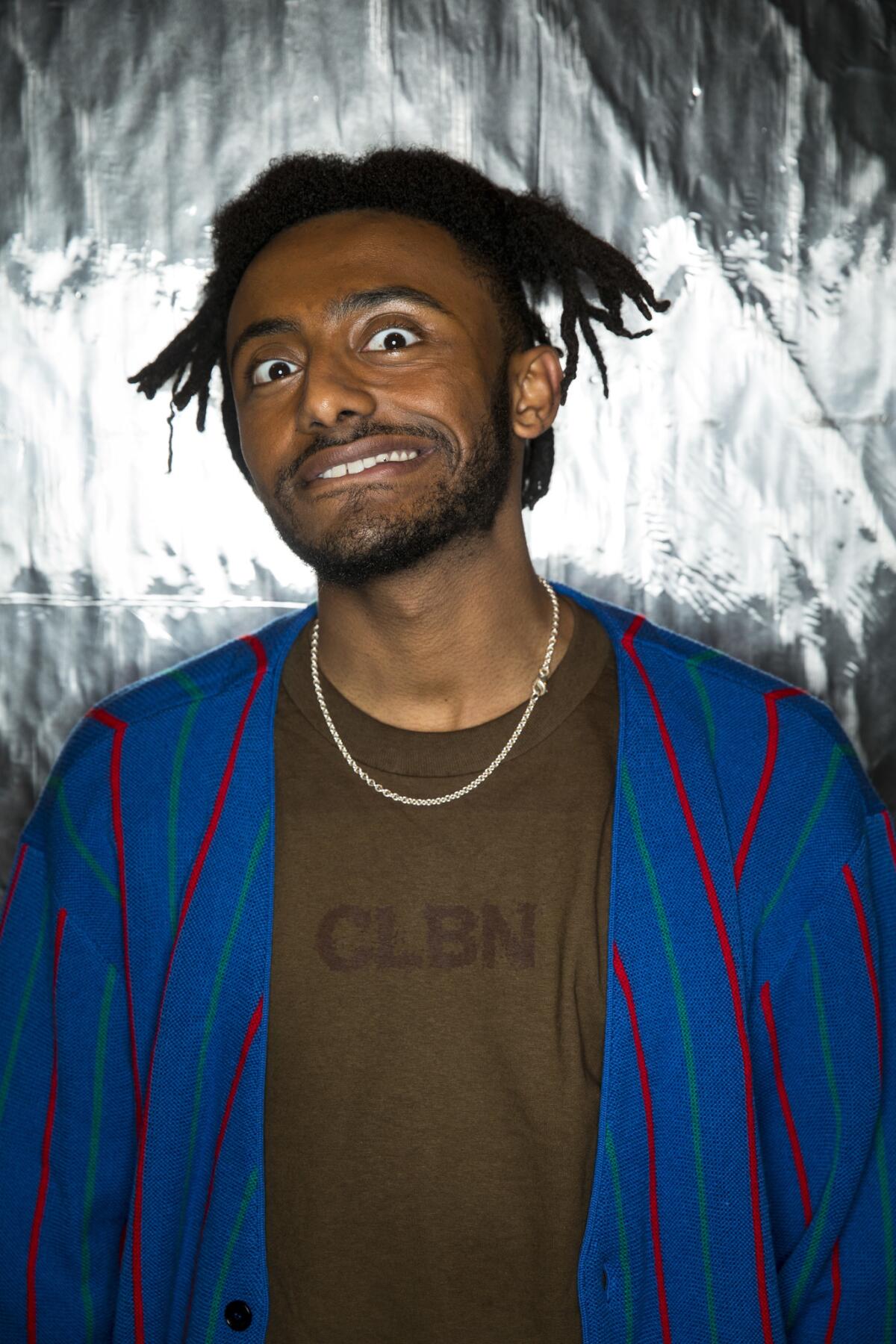
Adam Aminé Daniel grew up in Portland, Ore., to Ethiopian immigrant parents (Aminé, pronounced uh-MEE-nay, means “I believe” in Ethiopia’s official language, Amharic). Though he grew up in a black neighborhood, the rapper says he didn’t understand what diversity was until he got older and visited New York.
It was during his self-described “suburban” Portland upbringing that Aminé first experienced the quiet tendrils of racism often referred to as microaggressions.
“I feel like you feel racism anywhere in America, [but] it’s not like Southern racism in Portland, it’s more like hidden racism. Like you won’t get the job or you won’t get approved for that apartment you applied for because they’re selling it to another person who probably has the same credit as you, but they’re just a different skin color. Which is basically what gentrification is,” he said with a wry laugh.
He got his start in rap by creating “dis” songs, which involved cleverly insulting his friends and honing his dexterous wordplay.
“I kind of just thought I was better than my friends so I kept doing it some more for fun,” he said. “And then I took it more seriously once I realized that this made me happy and I felt like I was good at it.”
But he also pursued marketing at Portland State University as a plan B.
“I always kept it real with myself and I was like ‘if ... goes wrong, I can just work for an ad agency or something like that,’” said Aminé, who still does a lot of his own graphic design and creative direction. “If I wasn’t doing music I would probably be doing creative direction for someone else. I just enjoy that.”
Though they have since come around, his parents weren’t initially gung-ho about their son’s rap ambitions.
“When your parents come from a different country to America, they’re hoping their kids live the ‘American Dream’: being a doctor, a lawyer with a 401(k) and a white picket fence, a dog, a wife and kids. So when they see their kids [interested] in another field, they’re always nervous. They’re supportive now, they weren’t supportive at first.”
While living with his parents and trying to bring his music dreams to fruition, Aminé struggled with depression. In a 2017 New York Times article, he asserted that despite dealing with personal frustrations, “being depressed in black culture is not a thing.”
“You can’t tell your ... you’re sad,” he explained. “I still haven’t talked to anyone about that. I’ve never seen a therapist a day in my life just because, first of all I didn’t have money for a therapist. That’s definitely not a thing in black culture. And then, even when you do have money it’s like, I don’t know any one of my friends who have seen a therapist.”
He also chalks up his hesitance to seek help to the stigma that forces black men to deal with their issues in private and on their own. “I think that’s what makes black people strong,” he said. “Whenever you’re going through something, we just deal with it. It’s a good thing and a bad thing.”
After the mainstream success of “Caroline,” which was certified three-times platinum, Aminé partnered with Republic Records and released his debut studio album “Good for You” in 2017. The album went gold early this year, something the rapper says is more important to him than having a platinum single.
“Once my album hit gold, I’m good,” he said. “I don’t really care about the pressure of making a hit, I care more about if people are going to listen to me 10 years from now or not. My body of work is what matters more to me than a song.”
Looking forward to Coachella, Aminé said it would be his first time at the festival performing his own songs.
“I don’t get nervous for shows, I get more anxious,” he said when asked about his expectations for his set. “I’m a very stubborn person and when it comes to my work ethic, I don’t want no excuses. Anyone who knows me knows I just want to work, I don’t want to … chill and smoke and drink. I just want to get the work done.”
He went last year for fun but also to study the other performers and prepare for when his time would come around.
“I knew my album was coming out and Coachella might book me so I wanted to make sure I was learning a lot from what I liked in performances and what I didn’t like,” he said.
After Coachella, Aminé wants to branch out into TV, film and fashion, but his plans for that are still murky.
“I don’t necessarily like to speak too soon, but I definitely want to get into TV and film,” he said. Despite the Quentin Tarantino shout-out in “Caroline,” his favorite filmmaker is actually Aaron Sorkin, and he names “Molly’s Game” and “The Social Network” as two of his favorite films. “Insecure’s” Issa Rae, a friend, is also someone he looks up to. “And of course Donald Glover,” he added. “He’s doing everything for black people right now.”
But the young artist knows there’s plenty of time to execute an expansion.
“You don’t really get into TV and film with a co-sign, you get into it with good product,” he said. “I don’t think you should rush to make a TV show or a film. It’s more so, ‘I have this story that I really want to tell.’ It’s just like music.”
-----------
More on Coachella
FULL COVERAGE: Coachella 2018 live updates
The Neighbourhood on identity, Coachella and bouncing back from bad reviews
Beyoncé came to Coachella, and disrupted its entire culture
Readers think Coachella has become less about the music and more about the scene
Beyoncé’s Coachella performance was incredible — and she knew it
follow me on twitter @sonaiyak
More to Read
The biggest entertainment stories
Get our big stories about Hollywood, film, television, music, arts, culture and more right in your inbox as soon as they publish.
You may occasionally receive promotional content from the Los Angeles Times.
